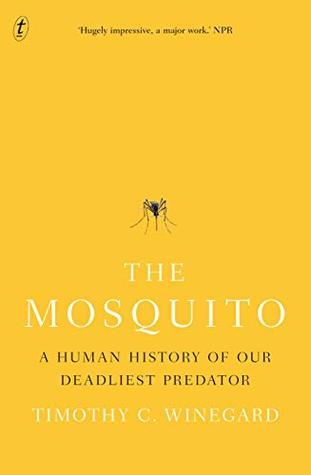More on this book
Community
Kindle Notes & Highlights
Read between
October 5 - December 31, 2019
Blood type O seems to be the vintage of choice over types A and B or their blend. People with blood type O get bitten twice as often as those with type A, with type B falling somewhere in between.
Columbus was not even the first foreigner to discover the Americas. Columbus was, however, the first to open the doors permanently to the prevailing presence of Europeans, African slaves, and their diseases in their new world.
history books tell us that the use of steel weapons and guns versus those fashioned of stone or wood safeguarded European victories. The real reason that European colonizers displaced or destroyed indigenous peoples, however, was largely a matter of disease and differing immunities. It was the dissemination of exotic European germs and foreign mosquitoes and their diseases unconsciously acting as biological weapons that sounded the death knell for indigenous peoples.
By 1612, when John Rolfe shipped the first crop of Virginia-grown tobacco to England, London already boasted more than 7,000 “tobacco houses.” These cafés offered nicotine junkies a place to sit and converse while drinking (as smoking was originally labeled) tobacco.
British control of colonial India required the ability to combat malaria, so Brits in India consumed powdered rations of quinine in the form of “Indian tonic water.” By the 1840s, British citizens and soldiers in India were using 700 tons of cinchona bark annually for their protective doses of quinine. They added gin to the liquid to cut its bitter taste and, most certainly, for its intoxicating effect. And the gin and tonic cocktail was born. It became the drink of choice for Anglo-Indians and is now of course a universal staple on bar tabs worldwide.
“The argument here is straightforward: In the American Revolution the British southern campaigns ultimately led to defeat at Yorktown in October 1781 in part because their forces were much more susceptible to malaria than were the American…. [T]he balance tipped because Britain’s grand strategy committed a larger proportion of the army to malarial (and yellow fever) zones.” A full 70% of the British Army that marched into this southern mosquito maelstrom in 1780 was recruited from the poorer, famished regions of Scotland and the northern counties of England, outside the malaria belt of Pip’s
...more
Given that Americans currently consume 25% of the world’s coffee, Starbucks ought to raise a toasting glass to the tiny mosquito. “Malaria even explains how the nation of the 1773 Boston Tea Party,” affirms Alex Perry in Lifeblood, “became today’s land of the latte.”
malaria “delayed the Union victory by months or even years. In the long run this may be worth celebrating. Initially the North proclaimed that its goal was to preserve the nation, not free slaves…. The longer the war ground on, the more willing grew Washington to consider radical measures.” Given the role of the mosquito in prolonging the grinding conflict, he reckons that “part of the credit for the Emancipation Proclamation be assigned to malaria.”


